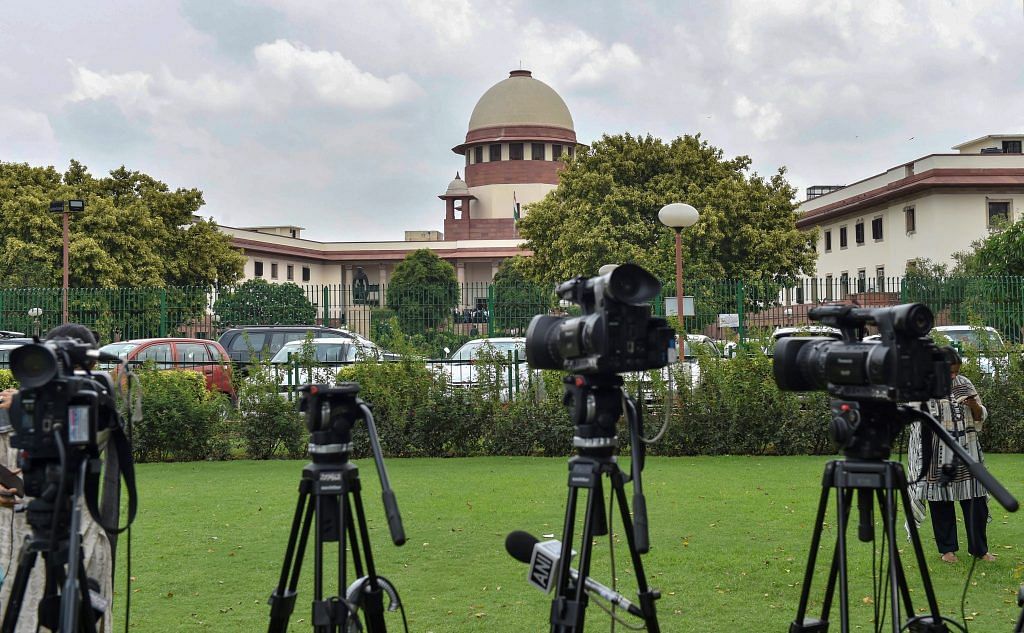After the 377 verdict, the inability of our political leadership to take an effective stand on decriminalising homosexuality will not be forgotten.
The landmark verdict by the Supreme Court in reading down Section 377 of the Indian Penal Code, which criminalises homosexuality, has once again reaffirmed our faith in the much-maligned judicial system of the country.
The judgment also underlines the failure of our political class to show the way forward on contentious issues, and act like leaders.
Narendra Modi is arguably among the strongest Prime Ministers India has seen in a long time. But, when it came to taking a stand on whether Section 377 should be decriminalised, Modi government took the easy way out, leaving the decision to the “wisdom of the court”.
Don’t people elect governments to lead them? If every contentious decision is left to the wisdom of the courts, why don’t we start calling the Chief Justice of India, the ‘Chief Executive of India’?
Also, isn’t it ironic that the request to the court was made by the government of a party that never misses a chance to question the tendency of the courts to interfere in functions of the executive and the legislature?
The failure of our political leadership – all parties are equally culpable – to take an effective stand on this issue will not be forgotten. The response was at best wishy-washy – with the Centre merely telling the court that there “does not appear to be any legal error in the judgement and the Supreme Court may take a final view ‘whether the judgement of the high court is legally correct or not”.
Also read: Pre-modern, pre-Section 377 Queer Ramayana shows sages desiring Rama’s body
It shows that while the tools our politicians use to lure voters and spread their agenda have evolved with time, their politics has remained stuck in a time warp – the offending Section 377 is a legacy of the British era (1861).
On decriminalising gay sex, most political parties were united in their opposition – overt or covert – when the issue came up in the Delhi High Court. Most, possibly, felt that taking a stand against retaining the section in the IPC could hit them electorally. What they didn’t understand was that India of 21st century was different from the Bharat of 19th century.
Under the Congress-led UPA-I regime, the ministry of home affairs (MHA) opposed the plea to decriminalise Section 377, asserting that it had been “generally invoked in cases of allegation of child sexual abuse and for complementing lacunae in the rape laws and not merely homosexuality”.
The MHA in its affidavit filed in the Delhi High Court even gave the specious argument that the law deserves to be retained to satisfy the demands of “public morality, public health and healthy environment”.
That the MHA stand was in conflict with that of the union health ministry, which said the section was coming in the way of anti-AIDS drive and must be read down, made it all the more questionable.
Also read: Section 377 exposes BJP and Congress’ doublespeak on homosexuality
Not surprisingly, the Delhi government, the Delhi Police and even the Delhi State Aids Control Society – Delhi had a Congress government at that time – chose to not even apprise the court of their stand on the issue.
Thankfully, the bench comprising Chief Justice A.P. Shah and Justice S. Muralidhar read down the contentious section in 2009, with Shah later (after his retirement) underlining that the judgment reflected what the Constitution-makers envisaged.
“In case of a moral legislation, when it is being reviewed by a Constitutional court, then the rule of majority rules should not count, because if the issue of morality is to be decided by the majority, as represented by the legislature and Parliament, then the fundamental right has no meaning. It is to be decided on the basis of Constitutional values and not majority rule.”
When the matter reached the Supreme Court, the MHA, acting on the advice of the law ministry, decided against taking a stand, leaving it to the wisdom of the court. More importantly, the Centre said – the view finalised by a group of ministers – that there was “no error” in the Delhi HC order, but wanted the Supreme Court to “take a final view in the matter”.
During the hearing, the UPA government even changed its lawyer arguing the matter in the court – additional solicitor general P.P. Malhotra decided to tell the court that homosexuality between consenting adults was illegal and immoral. He presumably forgot that the government had chosen not to take any stand!
The Supreme Court bench of Justices G.S. Singhvi and S.J. Mukhopadhaya decided that the HC order was not legally sustainable.
The bench, however, left it open for a “competent legislature” to “consider the desirability and propriety of deleting Section 377 IPC from the statute book or amend the same”.
While various political leaders criticised the judgment then, neither the UPA, which was in power for another five months after the SC order of December 2013, nor the current BJP-led NDA government took a step to remove the clause from the IPC or amend it to decriminalise gay sex.
Also read: Human rights lawyer by day, Delhi’s beloved drag queen by night
During the hearing before the Constitution bench, the Modi government tried buying time but the attempt was rebuffed by the bench. Like its predecessor, the Modi government too decided that the issue was a hot potato and must be left to the wisdom of the court.
That, however, didn’t stop BJP leader and MP Subramanian Swamy from calling gay-sex a threat to “national security” and against Hindutva.
Politicians need to evolve: Our politicians will need to play catch up with Indian society which is open, fair-minded and respects all views.
The Supreme Court has evolved since 2013 when two judges thought Section 377 was not unconstitutional. Five wise men today have decided otherwise.
